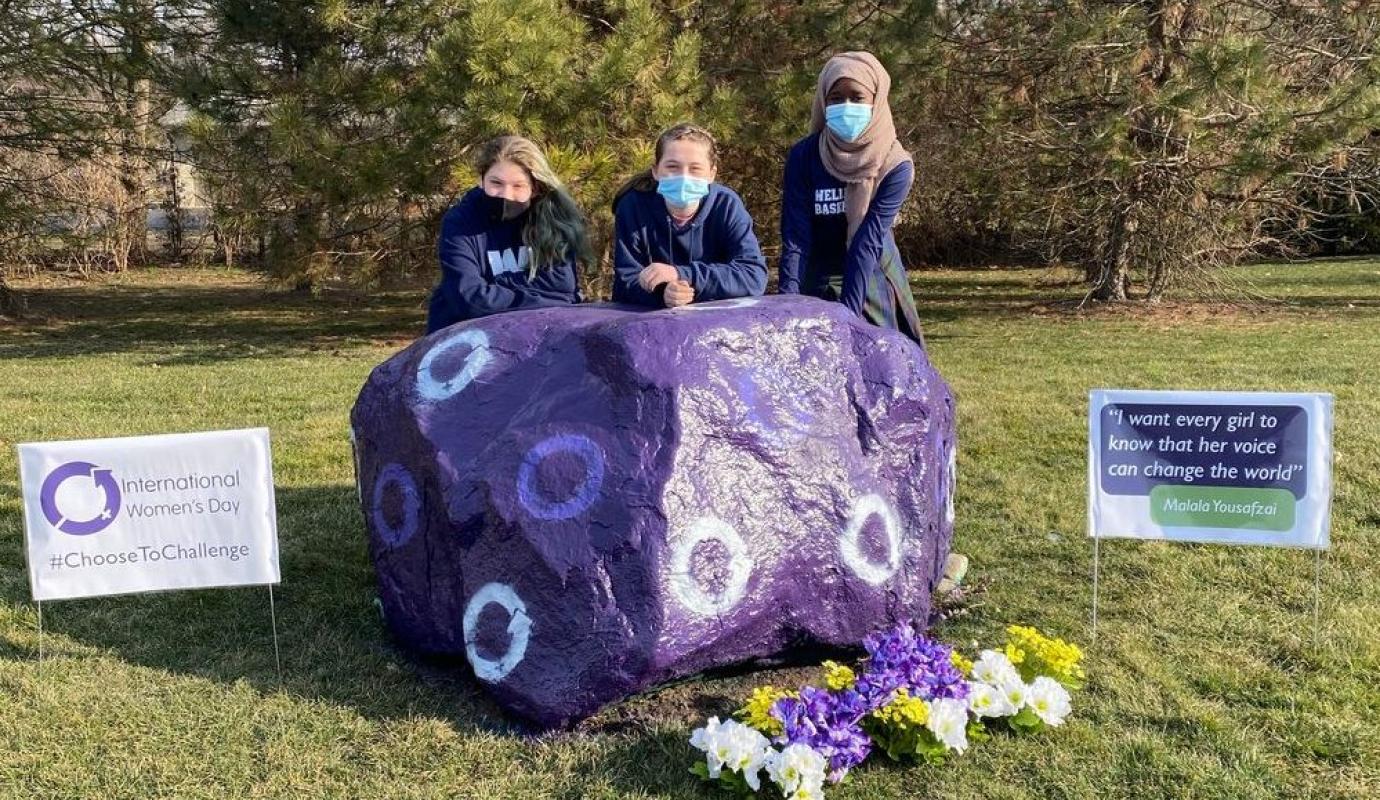Every member of our community is valued and vital because each voice has the power to inspire. When a single act of kindness can change a life and a group of likeminded people can shape the world, what we do matters.
Wellington kicked off Women’s History Month by celebrating International Women’s Day on March 8, highlighting the women and girls in our community and around the globe who choose to challenge and call out gender bias and inequality, elevate women’s achievements, and collectively help to create a more inclusive world. Whether through tech and innovation, leadership and entrepreneurship, athletics, education, creativity, and so much more, by uplifting women's vast accomplishments while also calling out inequality, we will build a better future for all.
In honor of the day, Upper School Art teacher Jaime Bennati painted the Wellington rock and designed an interactive experience for students of all ages to write the names of women who have inspired them. Members of our school community wore pink to show their appreciation for the women in their lives, and upper schoolers wrote messages of support and gratitude to teachers, coaches, mentors, friends, and family members who have made a difference. Faculty focused on the many women who contributed to their field of study. In the upper school course Biography of Cancer, which covers the history of the disease from science and politics to economics and advocacy, Upper School Academic Dean Dr. Brandon Sullivan highlighted many notable women who have made an impact, including the first woman Nobel Prize winner, Marie Curie, hematologist Lucy Wells, fundraiser and lobbyist Mary Lasker, first hospice founder Cicely Saunders, and journalist Rose Kushner, along with many others.
“The history of cancer is rich with talented and dedicated women that changed the landscape in cancer research, diagnostics, treatment, and advocacy,” Sullivan said.
Further strengthening our efforts to create a more equitable, diverse, and inclusive learning environment, Wellington’s first Celebration of Black Voices culminated in a memorable breakfast watch party for a video featuring Black voices from our own community. Mari Hannah ’21 opened the moving tribute with “Lift Every Voice.” Alumni, including Raymond Lewis, Jr. '00 and Bret Hairston '17, shared their unique and powerful Wellington experiences. Current students Annie Shen ’26, Henry Becker ’27, and Ayana Cooper Stevens '22 performed in a clarinet quartet with Middle School Math and Science teacher Me-Chelle Burkhalter P ’22. Kirem Braddix ’28, Sabrina Bong ’25, Sigal Judd ’25, and others provided thoughtful introductions and interludes between alumni speakers. Maya Avery ’22 closed the video with a beautiful rendition of John Lennon’s “Imagine.”
One of the things Bong and Judd touched on was the importance of using our innate childhood curiosity when reading history so that we fill in the gaps of “incomplete narratives” with the stories of people who may have been previously left out. Recently, middle schoolers had the opportunity to hear from guest speaker Jermaine Fowler of The Humanity Archive. An avid historian, Fowler is passionate about telling the stories of people we have never heard about. He discussed People of Color in the Middle Ages with Wellington students and shared how influential the Black presence was in Western European cities like Lisbon where social standing was considered more important than race.“
"Research is like digging for gold in humanity,” Fowler said. “Try to see something that someone else hasn’t seen.”
Building on the belief that if you can see it, you can be it, Wellington’s Female Students of Color club hosted a panel discussion on “Why an HBCU Might Be Right For You.” With 40% of Wellington’s student body comprised of students of color, and approximately 12% of African descent, the faculty and staff leaders of the club (Me-Chelle Burkhalter P ’22, Makiva McIntosh P ’31, and Dara Jackson) wanted to “share various perspectives on what it means to apply to, attend, and be an HBCU graduate,” McIntosh said.
FSOC facilitates the development of leadership skills and explores ways to be a leader both in and outside school, she explained. Participation in FSOC deepens bonds of sisterhood and supports our upper school female students of color in a fun and engaging way.
Faculty and students have been inspired to examine curriculum through a new lens that is not only innovative but also more inclusive. When 8th graders participated in a virtual reconstruction of Stonehenge at Wellington, part of their research involved identifying Native American tribes in Ohio who would have most likely built the Neolithic monument. In a research project that included math, physics, history, and PE, including the full narrative led to deeper understanding.
After first measuring the diameter of Stonehenge and determining the radius, students placed themselves on Roberts Field as markers to visualize the size and scale they would be working with. Then teams conducted more research on what scientists currently know, the type of technology used to build it, and the religious beliefs of the builders. Students also applied math and physics, using ratios, scale factor, conversions, and basic geometry, to calculate the force needed to move limestone from a local quarry across the river and through the dense forest land that used to cover central Ohio.
“Throughout the project, we were impressed with the 8th graders’ diplomacy, amazed by their creative thinking, and thrilled to see them synthesize what they have learned through the year to help them solve this challenge,” Middle School Humanities teacher Marianne Crowley said. “There were as many solutions as there were groups, and all presentations were impressive.”
